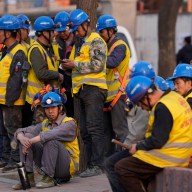TOKYO – Shopkeeper Yoshio Matsumura has always supported the opposition, even when it seemed like a lost cause.
On Sunday, however, Japanese voters joined him in droves, leading an election revolt that ousted the country’s conservatives after more than a half century of rule and put the untested Democratic Party of Japan firmly in control.
“People had been fed up for a long time,” said Matsumura, who lives in Saitama prefecture, which is next to Tokyo. “Their frustration reached a boiling point, and they finally rose up.”
Official results were still being counted Monday, but reports in all major media said the Democrats had won more than 300 of the 480 seats in the powerful lower house of parliament. That is more than enough for the party to choose the next prime minister and control the national agenda.
At least partially fueling the win was a record turnout – up about 2 percentage points from the last lower house election to more than 69 per cent, according to the Ministry of Internal Affairs and Communications.
Keiko Nishibori, 74, said lines at her local polling station were the longest she had ever seen.
“I think people realized this time how powerful their one vote could be and that collectively, those votes could lead to something much bigger,” said Nishibori, who is originally from Japan’s northern island of Hokkaido and has no firm party identity. “Sunday gave us confidence that we, indeed, have a voice.”
The Democrats rode a wave of discontent that made the choice of new leaders attractive to many voters, but now the party must deliver fresh solutions to a slew of entrenched problems.
Although Japan emerged from a yearlong recession in the second quarter, the overall economy remains weak. The unemployment rate hit a record 5.7 per cent in July, and spending continues to fall amid worries about jobs and wages. The party must also figure out how to cope with a rapidly aging and shrinking population, as well as national anger over a recent pension scandal.
To start, the Democrats have promised to expand the social safety net and reshape the world’s second-largest economy. Their proposals include a monthly cash handout of 26,000 yen ($280) to families with children, toll-free highways, a higher minimum wage and tax cuts – an expensive menu of ideas that critics have said is financially unfeasible.
One woman said voters will feel a bigger sense of achievement if the Democrats can actually deliver on those promises.
“If our life changes for the better, in a couple of years, we can be proud of what we did,” Mineko Osaka said. “Then that will convince even more people to be interested in national elections.”
The 40-year-old real estate agent said the big victory was a shock, even though most polls had predicted a blowout for the Democratic Party. But the trouncing was remarkable for its ability to take down even Liberal Democratic heavyweights, including a former prime minister and several ex-Cabinet members. Osaka’s choice to represent her Tokyo district, Kazuko Ebata, defeated the incumbent, former Defence Minister Yuriko Koike.
Still, Musashi Suzuki, 27, questions whether the new government can possibly meet such high expectations.
“People are certainly hoping,” said Suzuki, who works in a flower shop in Tokyo. “But can they really do it? If so, they’ll probably stay in power for a while. If not, things will just go back to the way they were.”














